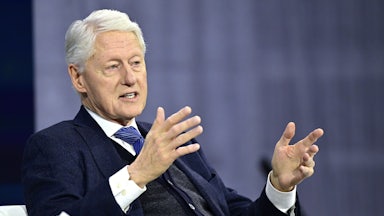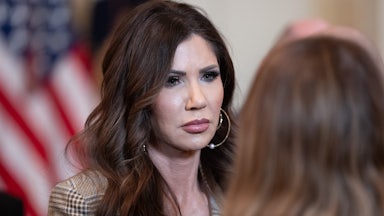The first person that Donald Trump nominated to serve as his attorney general for his second term had to back out in order to avoid the publication of a report that would have detailed the numerous instances in which he had sex with underage girls during drug-fueled parties. Trump’s current—emphasis on that word—nominee to lead the Department of Defense seems doomed, following disturbing allegations of rape, financial mismanagement of a veterans’ nonprofit, and substance abuse. If that wasn’t enough, he is also wildly unqualified: A former Army National Guard officer, he is best known as a Fox News host and talking head.
Much of the postelection media’s attention has understandably focused on those two heinous nominees. But many of the other people rounding out Trump’s next Cabinet are not much better. His pick to run the Department of Health and Human Services is a virulent anti-vaxxer who has been tied to a deadly measles outbreak in Samoa, has threatened to remove fluoride from the water supply, and has also been accused of sexual assault. Trump’s pick to serve as his national intelligence director is a possible Russian asset. Even if she isn’t, she’s still essentially doing in-kind P.R. work for Vladimir Putin (as well as Narendra Modi and—until very recently—Bashar Al Assad). The man he has tapped to head the FBI has no relevant experience, is an ardent believer in the QAnon conspiracy theory, and is determined to use his power to go after Donald Trump’s enemies, both real and imagined.
Speaking of relevant experience, almost none of Trump’s proposed Cabinet members have any. What they do have is money and, in many cases, deep conflicts of interest with the agencies they will be tasked with running.
Over the last month, the Democratic Party has been stuck in a turgid existential crisis, as the party licks its wounds following Donald Trump’s return to the White House. To the extent that Democrats have responded, it’s only been to forsake the role of a nominal opposition party: Instead of making plans to join a partisan scrap, many are signaling that they think their best move is to kiss up and play nice. Rather than take on a Cabinet to rival the horrors of Doctor Caligari’s, Punchbowl News reported on Friday that the early signs from Democrats suggest that many will use the confirmation hearings to “burnish their bipartisan credentials” instead, essentially co-signing the parade of horribles being spun up out of the Trump transition office. “That’s what happens when the other side wins,” Pennsylvania Senator John Fetterman said. “They get their choices in those things.”
A question: Why should they, though? Fetterman is correct that Trump will get his way on most matters. Why should Democrats make the mistake of being complicit in what’s likely to be a parade of corruption, abuse, and failure? For all the focus on Democratic disarray, Trump’s Cabinet nominees—and his embryonic second presidency—are already beset by the familiar scandals and chaos that plagued him the first time around. Instead of attacking a group of wildly unqualified, often dangerous, and nearly uniformly plutocratic nominees, the party has been silent—and these reports suggest they’ll roll over rather than, say, start making demands of their own: that Trump burnish his bipartisan credentials; that he demonstrate a commitment to unity. Taking a supine position instead is a huge mistake at a perilous moment. It will be an even bigger one when a newly empowered and—if the party stays silent—unencumbered Trump takes office in January.
If you squint, perhaps you can see the more cautious Democrats’ logic. For most of the last decade, they have operated on the—often correct!—theory that the best way to defeat Trump is to stand aside and let Trump defeat himself. During Trump’s first term, the party was arguably at its most successful in thwarting Trump when it stood aside and let him take himself down in a barrage of self-inflicted errors and early morning tweetstorms. Naturally, this was all fun and games until “let Trump fail” led to a devastating pandemic.
During the 2024 election, the party hoped it could simply remind voters of what Trump was like. Much of Kamala Harris’s campaign—and before that, Joe Biden’s campaign—was premised on the (also correct!) argument that Trump was unfit for office, that he was an aspiring tinpot dictator, that he was unstable and only out for himself. That obviously did not do the trick. Voters know that Trump is an amoral, chaotic, borderline insane person, and a plurality of them didn’t care. Maybe Americans just aren’t so swayed these days by politicians’ personal defects. Or maybe they don’t stand out as resoundingly against a status quo with even deeper problems.
But given that Democrats have come to be seen as too forgiving of this broken status quo, the moment calls for a new, bolder, and more offensive strategy. Though TNR editor Michael Tomasky is right that Democrats have a golden opportunity with next year’s confirmation hearings to paint these billionaire nominees as out-of-touch plutocrats, there is no reason whatsoever (unless you’re Fetterman, trying to appeal to some magical middle voter) for them to hold their fire for another two or three months. As Chris Murphy, the Democratic senator from Connecticut who is one of only a few in the party making a proactive case against Trump and his Cabinet nominees, says, “This place should be on fire” right now. Trump’s Cabinet selections “signal that he wasn’t kidding about using his power to try to destroy his domestic enemies.”
Focusing—or, more accurately, letting the media focus on—the numerous personal defects of Trump’s Cabinet nominees is fine. But it’s clearly not enough. One reason that the Democrats are in this mess is because the party never conclusively made a cogent or consistent counterargument to Trump’s larger message. There’s an argument that he consistently threads between his rants about Arnold Palmer’s penis and the “late great” Hannibal Lecter—that the elites running the country are deeply corrupt and must be destroyed. He and his Cabinet of billionaires may not be the best messenger for this cri de coeur, but these notions remain persuasive and appealing for a large swath of the country.
Moreover, Democrats have not come up with an equally compelling counterargument. They have a belated chance now to rewrite the script. To get there, Democrats cannot simply focus on Trumpworld’s personality defects, the (myriad) skeletons in Trump’s closet and the closets of those surrounding him, or their general fitness for office. That these people are uncouth is part of their charm. Democrats have to be laser-focused on their policy proposals and their bad real-world impacts—and about defending the idea that the government can be used to make people’s lives better.
Trump’s current Cabinet nominees offer a distinct chance to do just that. Pete Hegseth, the Fox News presenter, is not just unqualified to lead the largest military in the world, he is there to push ridiculous ideas about “wokeness” and to ensure that its leadership is loyal to Trump. He is emblematic of Trump’s larger push to ensure that bootlickers and ring kissers are heading departments—not people who are actually qualified to lead them or, for that matter, who even really understand what they do.
Kash Patel, the arch loyalist tapped to lead the FBI, is similarly there only to use it as part of Trump’s larger crusade against those who he believes have wronged him. A conspiracy theorist with minimal experience, his only qualification is the one Trump cares about above all else: supreme loyalty to Donald Trump. The same is also true of Pam Bondi, the former lobbyist for Qatar and a woman who once rescheduled an execution so she could attend a fundraiser, whom he tapped to lead the Department of Justice after Matt Gaetz, his first nominee, bowed out.
Robert F. Kennedy Jr., the man he has tasked with overseeing the country’s health, is a crackpot and nutjob who has no actual interest in public health or science, only batty ideas about vaccines and other measures aimed at improving the public good. In Kennedy, Democrats have a real opportunity to co-opt his larger agenda, arguing that, yes, corporations have made much of our food and water unsafe. But Kennedy’s approach, which privileges junk science over facts, is not the answer.
Gabbard, his dictator-loving pick to be national intelligence director, offers the party something it badly needs: a reset in its approach to foreign affairs. The Biden administration has badly damaged Democrats’ reputation in this area thanks to his blank-check approach to Israel’s brutal campaign in Gaza, which has fairly been described as genocidal. Its lenient approach to Israel has badly damaged the argument that the Democrats are a party for a “rules-based order” or, for that matter, for global stability. But in Gabbard—and, for that matter, Trump—they have a useful foil with which to rebuild their credibility, arguing that the United States must stand for democracy, freedom of expression, and international law—and not the murderous cranks of whom Trump and his would-be national intelligence director are so enamored.
The rest of the Cabinet is full of rapacious plutocrats and American oligarchs. The total net worth of his incoming Cabinet is $13.3 billion and includes 11 billionaires—and that doesn’t count figures like Elon Musk, Trump’s benefactor, who will have enormous influence over his administration. These are very clearly not people who are there to enact Trump’s supposedly “populist” agenda. They are certainly not there to break the elite hold on American political and economic life. They are there to get richer—and to also help Donald Trump get richer. That is one of the easiest and oldest political arguments there is—even if it’s one that many Democrats are uncomfortable making.
Indeed, one could easily make the case that Trump’s Cabinet picks represent a betrayal of the “mandate” he won in November—they represent a return to plutocracy and an abandonment of struggling, working-class voters. Yes, Donald Trump won. But the choices he’s making are disastrous. Democrats should say so. And they should start doing so now, instead of waving the green flag for all these scoundrels in the name of bipartisanship. Because once this wrecking crew gets down to wrecking, Democrats are not going to want their fingerprints on any of it.










